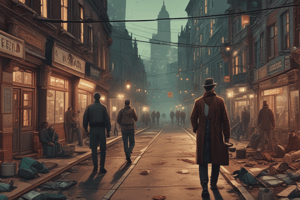Podcast
Questions and Answers
What do subcultural theories focus on?
What do subcultural theories focus on?
- Status frustration
- Economic crime
- Juvenile delinquency (correct)
- Educational achievement
Who criticized Merton's view on deviance?
Who criticized Merton's view on deviance?
Cohen
What did Cohen say leads to delinquent behavior among working class boys?
What did Cohen say leads to delinquent behavior among working class boys?
Status frustration
According to Miller, what are the focal concerns of working class boys?
According to Miller, what are the focal concerns of working class boys?
Cohen's theory addresses female delinquency.
Cohen's theory addresses female delinquency.
What did Cloward and Ohlin argue regarding working class youth?
What did Cloward and Ohlin argue regarding working class youth?
What is the primary goal of gang culture according to Pitts?
What is the primary goal of gang culture according to Pitts?
What did Nightingale study?
What did Nightingale study?
Flashcards are hidden until you start studying
Study Notes
Subcultural Theories
- Subcultural theory explains juvenile delinquency primarily among working-class youth and emphasizes the collective, rather than individual, nature of crime.
- Delinquency is often driven by social groups or gangs, rather than personal ambition for material gain.
Cohen's Perspective
- Cohen critiques Merton's focus on individual deviance, asserting that many acts of delinquency are group-based.
- He studies working-class boys, identifying "status frustration" arising from blocked aspirations, leading to delinquency as a means of gaining peer respect.
- Delinquent behavior serves to counteract low self-esteem developed from educational failure and societal rejection.
- Cohen posits that institutions like schools contribute to this frustration by not equipping working-class boys with the necessary skills for success.
Evaluation of Cohen
- Research by Willis suggests that some working-class youths redefine success, not viewing educational failure negatively due to different job aspirations.
- Many working-class boys conform in educational settings, despite poor academic performance.
- Critiques focus on Cohen's neglect of female delinquency and the role of social control agents, like police, in influencing perceptions of deviance.
Pitts' Research
- Investigated gang culture in Waltham Forest, finding that respect and status are central motivations for gang membership.
- Hyper-masculine identity and territorial disputes are common, with violence often linked to perceived disrespect.
Miller's Theory
- Miller proposes that working-class boys have distinct norms and values, termed "focal concerns," which include an acceptance of violence (trouble), toughness, and thrill-seeking (excitement).
- He argues that these focal concerns lead to law-breaking behaviors, often unintentional, as they adapt to their sociocultural environment.
Cloward and Ohlin's Contributions
- They agree on the limited legitimate opportunities for working-class youth but introduce the idea of varied subcultural responses: criminal, conflict, and retreatist subcultures.
- Each subculture reacts differently to their circumstances:
- Criminal subculture focuses on gaining status and financial profit through gang involvement.
- Conflict subculture is characterized by aggression and antisocial behavior without a focus on economic gain.
- Retreatist subculture revolves around substance use, including alcohol and drugs.
Nightingale's Research
- Conducted a study on young black gangs in inner-city areas, highlighting unique subcultural dynamics in urban environments.
Studying That Suits You
Use AI to generate personalized quizzes and flashcards to suit your learning preferences.



